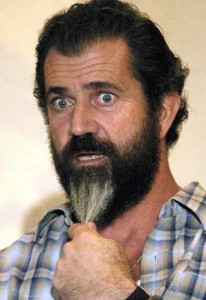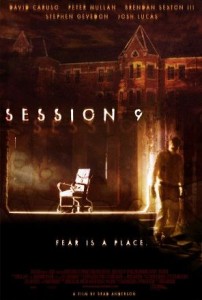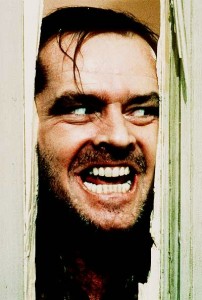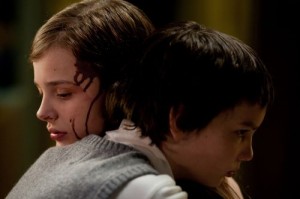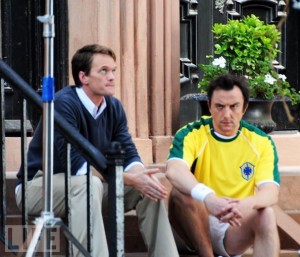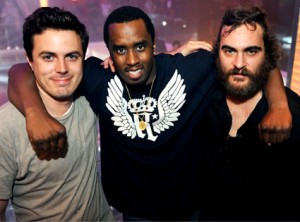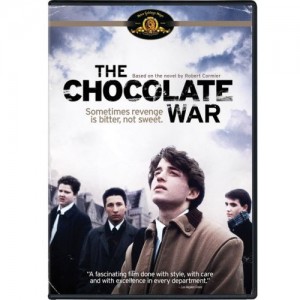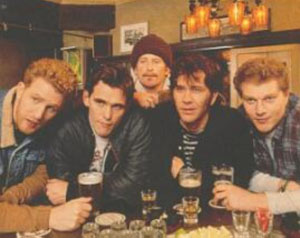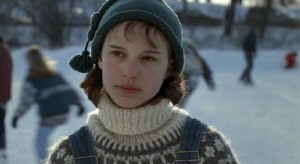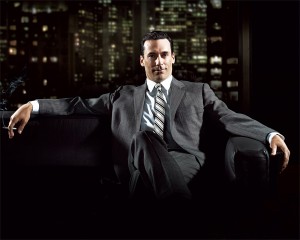Frenzy On Blog
Mel Gibson and Compartmentalization
I was perusing this week’s issue of Entertainment Weekly and I came across Mark Harris’ latest piece entitled, “Thanks, Mel. Seriously.” For the most part I really enjoy Harris’ writing and I find him to have some pretty sharp insights into the goings-on in Hollywood. However, as I was reading his latest essay, I found myself befuddled by a position he takes.
I don’t know Mel Gibson personally, so I find it odd to write the following: he seems like a fairly despicable person. Between the racism, the antisemitism, and the rage-fueled taped phone calls that I couldn’t avoid, he doesn’t exactly seem like a person I would want to hang out with for any length of time. But I do believe that the man is a talent, both behind and in front of the camera. When this whole brouhaha about The Hangover 2 came out – Mel was supposed to have a cameo, but then because of his transgressions, was let go – I was excited to see him play the role. I enjoy seeing the man on screen. Even after his whole drunken antisemitic rant in Malibu a few years ago, I still saw him in Edge of Darkness and liked it well enough. I have the ability to separate the character he plays from who he might be in real life. I mean, I think Spike Lee is one of the greatest filmmakers we have, but I disagree vehemently with some of his political views. To take it a step further, I think Woody Allen is one of the best filmmakers of all-time, but I find his actions with his (now-wife) adopted stepdaughter abhorrent. The actions and opinions of these two men don’t make me enjoy or despise their output any more or less. When Tom Cruise jumped on a couch and spouted his ridiculous political opinions, I didn’t give a shit because what he does outside the realm of a movie screen doesn’t concern me.
So I found it odd to see Mark Harris write that the maxim of “It should be all about the work” strikes him as “peculiar.” And I found it especially strange when he writes that, “[T]he ability to take a great deal of proof that someone is a loathsome creep and tuck it away in a corner of your brain that even you can’t find just so you can enjoy some dopey comedy doesn’t feel to me to be evidence of a healthy perspective but rather of a weirdly over-developed ability to compartmentalize.” Wow, that’s a lot of judgment about people who go to the movies. Because, you see, anybody that has ever enjoyed a film has “a weirdly over-developed ability to compartmentalize.”
Compartmentalization is what we do when we go to the movies, except we call it “suspension of disbelief.” Unless you feel like Robert Downey, Jr. actually is Iron Man, then guess what? You’ve compartmentalized. It means you have the ability to believe that what is actually happening on the screen doesn’t necessarily correspond to what is happening in real life, that you can believe that an actor is the character he is playing rather than the actor himself. Just because one particular actor might have done some despicable and disgusting things in their private life doesn’t mean that the character they are playing is influenced by those actions. And if you are influenced by those actions, then that doesn’t make you a more caring, sensitive person, it means that you are unable to suspend disbelief with one such person. But I find that to be strange because if you can’t believe that Mel Gibson is anything other than the racist pig that he (probably) is, then how can you believe that Brad Pitt is anything other than the (fill in the Brangelina reference here) or that George Clooney is anything other than the (insert womanizing liberal reference here), etc. etc.
I have my opinions about Mel Gibson as a person, but I also have my opinions about his talents as an actor and they do not inform one another. I’m not saying I have the correct view, but I do think that Mark Harris is wrong in saying that my ability to compartmentalize is “weirdly over-developed.” Like I said, we all do it every time we go to the movies.
5 Comments »Halloween Festivities
New York City is kind of a nightmare on Halloween. It’s impossible to get a cab, the subways are filled to the brim and the sidewalks seem like they are overflowing. Everybody comes to Manhattan on Halloween to get completely wasted, vomit in the street, and maybe hook up. It’s amateur hour and it’s one of my five least favorite days to go out in NYC (St. Patrick’s Day and New Year’s being high up there). Alas, I’m always compelled to go out and get involved in the festivities, drink too much and then stumble home to see what classic horror films are on TCM.
But book-ending that night of terror, I like to have a few other nights of terror by watching horror movies exclusively, having a marathon in my apartment. Sometimes friends will stop by and catch a movie or two, but I like to get into the Halloween spirit regardless, and I usually pick out a few old standbys and a few new ones. I’m still putting together my list for this year, but I usually always watch Brad Anderson’s Session 9, Kubrick’s The Shining, and often Tobe Hooper’s The Texas Chainsaw Massacre. This year, I think I’m going to throw in Frank Darabont’s The Mist, Georges Franju’s Eyes Without a Face, Troll 2 (I always like a funny one to throw in there) and then I’m still debating which horror films I haven’t seen to add to the program. At this point, it’s getting harder to weave in new horror films that I actually like. It’s becoming increasingly harder for me to get truly scared by horror films, so I’m happy just to find something that gives me the chills or at least tells an entertaining story. So I’ve been looking through Netflix and trying to find horror films I haven’t seen available to watch instantly. I’m thinking about the recent Carriers, Romero’s Survival of the Dead, and maybe the older Girly. I also will make time to watch the premiere episode of Darabont’s adaptation of the Walking Dead on AMC. What else should I add to this list?
But, in the spirit of giving, I wanted to help my NYC peeps find some cool horror festivities during the week and weekend, where they could congregate with fellow horror lovers. And with that in mind, I think the best idea is to check out the Film Society at Lincoln Center’s horror slate called “Scary Movies” that runs from today (Oct. 27th) through the weekend. The program they have sounds pretty excellent, including The Creeping Flesh (a Peter Cushing, Christopher Lee flick), the original Hellraiser, Carrie, and the new Australian horror picture The Loved Ones, which is getting excellent buzz. The Film Society at Lincoln Center has been killing it lately with excellent programs (they recently had a Rohmer retrospective, which was heavenly) and this one is sure to be a lot of fun. Check out the website for more info: http://filmlinc.com/wrt/onsale/scarymovies.html
Elsewhere: The IFC Center is showing midnight screenings of Wes Craven’s A Nightmare on Elm Street through the weekend, Film Forum has Psycho playing all day throughout the weekend as well. But if you’re looking for something a little bit more underground, my good buddy and filmmaker Shal Ngo has put together a horror movie montage called Brain Bludgeon at the reRun theater in DUMBO. Shal is a pretty talented up and coming filmmaker and he spent an inordinate amount of time watching and then sewing together clips from literally hundreds of forgotten horror movies. Check out the trailer.
If you know about anything else going on in NYC for Halloween, let me know and I’ll try to update this post with anything that sounds too good to miss.
2 Comments »The Other Facebook Movie
Catfish was enjoyable to watch, but it unfolded in pretty much the way I would have expected it to. Of course, I couldn’t have predicted exactly what these three young men would find, but from that first instant, it’s clear that it’s not going to end well.
For those who are unaware, Catfish is a documentary in which two young filmmakers (Ariel Schulman and Henry Joost) follow around Schulman’s photographer brother Nev after he befriends a family of artists that live in Michigan. It starts when eight year old prodigy Abby sends Nev a painting she did based on a photograph he took. Impressed by the work of such a young girl, Nev becomes her pen pal, then later chats with her mother and her older sister and brother and becomes friends with them all on Facebook. After a while, Nev becomes rather fond of Abby’s older sister Megan and they start a long-distance relationship of sorts (long phone conversations, constant text contact) despite never having met each other.
One of my issues with the film really has nothing to do with the film itself; it’s about the marketing. So much emphasis on the marketing has been on the “don’t spoil the secret twist for anyone” aspect of the film that it winds up detracting from what is otherwise a rather intriguing story. It’s clear to any sentient human being that this story is not going to work out the way Nev so desperately wants it to and as the evidence of lies begin to mount, I wish I hadn’t been told by the marketing folks to expect some massive twist because it was kind of gently unfolding in a logical way. I think it caused some disappointment on my part, expecting something truly mind-blowing when the reality of the situation was fairly obvious. I’m going to delve into some spoiler-ish territory here, so don’t read onward if you don’t want to know about the “twist” which isn’t really a twist.
I think the film really finds its footing in terms of character and emotion when we reach the second half and discover that Nev has actually been fooled by one sad woman. I think the most heartbreaking aspect of this whole episode is not her almost unbelievably depressing life, but Nev’s reaction to this. I mean, throughout the film I was kind of shaking my head at Nev’s naivete, wondering how he could be so foolish as to be duped by this woman, despite the complexity of her hoax. But when it sinks in for him that this woman that he developed feelings for was really a mother with a husband and two handicapped stepchildren, he does the most remarkable thing: he shows compassion. He doesn’t get angry with Angela or scold her (maybe gently he does), but instead tries to understand her motivations for doing this. One could say that Nev had cameras on him, so perhaps he was merely playing the hero for the sake of the film, but I felt he was genuinely sorry for this woman despite the fact that her actions had clearly hurt him. That, to me, was the heart of the film.
Other than that, the three dudes (including the two directors) are enjoyable enough to be around; there’s a particularly endearing moment when Nev reads some of the risque texts that “Megan” had sent to him after realizing that she’s probably not real.
I suppose my biggest issue with the film was that the filmmakers were kind of narcissistic enough to believe that in the end, their story was the most interesting. In fact, Angela’s story is the most compelling. I think more experienced filmmakers might have gotten to that house and realized, “wow, let’s start here and follow Angela around for a year and learn about her life.” Instead, they exploit her as this kind of tragic villain who swoops in at the end of the film when I think she’s got more of a story to tell. But I think the truth of the matter is that these filmmakers didn’t have the means to follow her around for a year and they seemed too scared around the family to be comfortable enough doing so. Regardless, I felt there was a missed opportunity there.
It’s funny to me when people refer to this as the “other Facebook movie” because I don’t think Catfish or The Social Network are about Facebook. I think they are thematically about social media, but only tangentially. The Social Network is about alienation and the founding of a company while Catfish is really about striving for connection by any means necessary. Facebook, as an entity, is really just a MacGuffin for both of these movies and both films deserve better than to be labeled as merely “Facebook movies.”
1 Comment »Jackass 3-D (Dir. Jeff Tremaine)
As much as I pride myself on my film snobbery, I’m an unabashed fan of the Jackass series and films. I used to say to anyone who would question me, “well, it’s stupid fun, but I like it for some reason.” Well, I no longer think of it as just “stupid fun.” Don’t get me wrong, I don’t think the films are shining examples of witticism. However, they are certainly more witty than people give them credit for. The stunts that they pull are so absurd as to be almost brilliant, but what really gets me are the ad-libbed reactions that Johnny Knoxville or Chris Pontius will throw out there after a stunt, like, “oh man, that hurt to do that to you” after Pontius puts a fish hook in Steve-O’s cheek.
The key to any great comedy is to give us likable characters and put them in precarious situations where we care about the outcome. Jackass has perfected this formula. All of the guys in the films are inherently likable because they are 1) self-deprecating and 2) self-harming; we, as human beings, tend to have a soft spot for people who are self-deprecating and for those that will harm themselves for our benefit. And we always care about the outcome of each of these insane stunts and it’s usually either 1) I hope he doesn’t die and/or get maimed or 2) I hope he doesn’t vomit. What the films do that is somewhat revolutionary is take out the whole business about a plot and story. But, the interesting thing is that over the course of the series and the films, we have certainly seen character growth and bonds. And male bonding is really what the series has always been about; just getting together with your best buddies and doing dumb stunts in the hopes of making your pals laugh.
But enough trying to analyze the complexities of Jackass 3-D. I went to the midnight showing with two of my best friends and we – like most people in the theater – had quite a few drinks beforehand (and during). The crowd was wild, which was what I was hoping for when I decided to see the midnight showing. This is truly one of those must-see theater experiences because it’s not the same watching the film at home, without hearing the crowd collectively go, “ohhhhhhhhh.” I don’t necessarily know that the 3-D part of the film was warranted or that they truly take advantage of it outside of a few scenes at the beginning and end, but I will say that if you’re going to see this movie, then you are going to get exactly what you paid for and signed up for.
I will say that I don’t think the film is as strong as the first two installments. Perhaps it’s a result of getting older (both myself and the crew) or perhaps it’s because there’s only so many new ways to put yourself at risk of death and disease, but the film didn’t make me laugh or cringe as much as the first two. However, it’s still ridiculously funny and one of the best times I’ve had in a theater this year. I don’t want to spoil the stunts for you, but I will say that I enjoyed the scene with Super Mighty Glue, the scene with the gorilla in April and Phil Margera’s hotel room, Bam’s “Rocky” re-enactments, the “Helicockter,” the scene where Wee-Man walks into a bar with his little person lady friend, the scene with Knoxville and the bull, Steve-O and Pontius playing “tee ball,” and a whole handful of others. There were a few parts that fell flat, but the film moves so fast that we don’t have time to notice and nothing really made me gag, which is both a plus and a minus. The sweat-suit cocktail, though, was one of the most disgusting things I’ve ever seen and I mean that as the highest compliment.
Anyway, I’m surprised I was able to write 700 words about a film that is really all about the visceral. And my visceral reaction to the movie was: very, very funny.
Gay Dilemma
Since everyone else is weighing in on this topic, I figured I’d throw my two cents out there.
In case you haven’t heard, Ron Howard’s new movie The Dilemma has a trailer in which star Vince Vaughn calls a car “gay.” This seems like a fairly regular occurrence these days; someone will use the word “gay” in a pejorative way. In fact, even in liberal New York City, I hear that term thrown around by tens of people a day – gay and straight – to refer to something that is not homosexual. In my opinion, using the word “gay” in that manner is inappropriate and wrong and I try my best not to use it in such a way. But, I’m not about to say that characters in films can’t use it.
There has been such an outrage over Vince Vaughn’s stupid line in a trailer for a (probably) stupid movie that they have removed the word from the trailer. Yay for equality? The issue here, for me, is that just because a character in a work of fiction is racist, homophobic, sexist, etc. it does not mean that the creator of that character is. If you disagree with the character’s use of the word, then it’s your right to not like that character. We hear things we don’t want to hear all the time and if we want to, we can be offended by everything we encounter. But once you start censoring what characters in films and literature can or cannot say, then what is the next step? Are we going to go back and remove the name “Nigger Jim” from every copy of The Adventures of Huckleberry Finn? Are we going to edit out the whole “do you know how I know you’re gay?” section from The 40 Year Old Virgin?
What I’m trying to say here is that art shouldn’t have to adhere to the standards of society; that’s why it’s art, it should stand outside of it. Now, one could make the argument that The Dilemma is hardly art, but who gets to be the arbiter of that? Art is subjective. If people want to get up in arms over the use of a possible slur in a film that will probably have no influence on their life? That’s their prerogative, but it seems like an awful waste of time.
6 Comments »Let Me In (Dir. Matt Reeves) – SPOILERS
Tomas Alfredson’s Let the Right One In was one of my favorite films of 2008. It was atmospheric, moody, complex, metaphorical, and romantic in the strangest possible way. I loved that it raised some interesting questions about what it would mean to fall in love with a vampire who will always be 12, how that love would change as one partner aged noticeably. I enjoyed thinking about what it would mean that the vampire looked like a twelve year old, but was in fact much older than that; if that’s the case and this is a vampire that lures 12 year old boys into being her protector and (presumably) lover, then doesn’t that make this vampire a pedophile?
The point is that it was a film that dealt with complexities we would never find in an American film, right?
The remake, entitled Let Me In, surprised me in how faithful it remained to the Swedish original. I would say that it remained true to the mood and atmosphere of the first film while adding some interesting wrinkles here and there as well as making some improvements. One noticeable improvement is that writer/director Matt Reeves excised the subplot with the nosy neighbor who is transformed into a vampire. He manages to keep the iconic image of the woman bursting into flames in her hospital room, but we don’t have to deal with her whole boring back-story.
I also think that Reeves chose two skilled actors in Chloe Moretz (as Abby) and Kodi Smit-McPhee (as Owen), actors who I think help the audience sympathize with them more. The basic outline of their “love” story is intact, but my perception of it changed slightly. I was much more aware of the romantic nature of the film in this version and the ways in which Owen cares for Abby and vice versa. Owen, especially, is almost comic in his empathy. When Abby vomits after trying a Now & Later, Owen’s first reaction is to hug her tightly. It’s a heartwarming moment. Abby, of course, cares very much for Owen, perfectly expressed in the climactic pool scene (more on that later). The way in which she cares for Owen reminded me a bit of the way Adam Sandler’s character expresses his love for Emily Watson in Punch-Drunk Love. When there is an boiling rage inside of you, but you want to express your love, sometimes your love is not expressed in the things you say or do, but in the way you protect someone with your rage. I think that’s the point of Abby and Owen’s love affair, they express their affection in different ways, but they can both recognize that it’s affection regardless.
Another reason that I responded strongly to this film is something my viewing companion brought up. She said there was something about hearing the dialogue in our own language that made the film more effective. I thought it was an interesting point. I love foreign films, love reading subtitles, but there indeed is a difference between hearing words actually spoken than reading them as they are being spoken in a foreign tongue. Not only that, I was better able to appreciate the sense of foreboding and terror because I didn’t have to worry about missing a line of dialogue.
I really have nothing but positive things to say about the film since it’s almost exactly like the original (emphasis on ORIGINAL)…except for the pool scene. I think there are a number of things wrong with the scene as presently constituted, including the fact that it seems to all happen much too quickly. But there is one big difference that really kills it aesthetically and that’s that the bullies decide to turn the light off inexplicably. Turning the lights off makes it hard to see what’s happening and we should be seeing absolutely everything. The power of that scene in the original is that we see what the boy doesn’t as he is drowning. But now, we can’t see much. We see enough to know what’s going on – including a severed head – but it doesn’t have the same impact or the same beauty as the original version of that scene did. It let me down a bit.
I’m also of two minds when it comes to a shot that Reeves inserts of Owen seeing a photo of Abby and the Richard Jenkins/protector character as a young man. It’s implied in the original that the Owen character would now be taking on the “protector” role, but here it’s completely spelled out for us.
Ultimately, I’m not unhappy that the film was made, but I’m not sure it was necessary either. I think the first version is a superior product, despite whatever flaws it might have, but in the end I guess I can’t argue with remaking the film the way it was remade. If nothing else, people who won’t go to films with subtitles will now have a chance to see this story told and told in a similar fashion.
But I think if you’ve seen the original, there’s not really a pressing need for you to see the remake.
1 Comment »Enter the Void (Dir. Gaspar Noe)
I had really high hopes for the latest twisting narrative from Gaspar Noe. I’d been following the film since it’s been in production because the idea behind it was brilliant: it’s told from the perspective of the main character from beginning to end…except the main character dies half an hour into the film, so we follow his spirit as it soars around the city (and backwards and forwards in time). We’ve seen the first-person perspective used in spurts in films like Strange Days, but it seems like Noe has not only employed it for the length of his film, but he’s also perfected it. We truly feel as though we’re seeing the world through the main character’s eyes, rather than a man holding a video camera and running around. In other words, I think the cinematography and look of this strange film is award-worthy, brilliant, some of the best I’ve ever seen. Noe deserves special credit for envisioning and executing a film that is so visually complicated.
However, I don’t even want to describe the plot of the film for you because it’s really not worth it. It’s got drugs, abortion, sex, prostitution, blood…and it’s all, true to Noe’s form, extremely graphic. But sometimes Noe confuses the controversial and gratuitous with interesting. The truth of the matter is that Oscar, the main character, didn’t need to be a drug dealer and his sister didn’t need to be a stripper/prostitute and the film didn’t need to be set in the flashing lights of Tokyo for it to hold our attention. The sheer genius of the cinematography would have kept us focusing on anything, it’s just a shame that Noe couldn’t find a story that was worth telling.
Having said all that, I do think there are some profound points made here about the nature of life and death. Clearly Noe has a view of death that is similar to a kind of Buddhist philosophy and there is even a (rather forced) mention of the Tibetan Book of the Dead. But I don’t think the film is nearly as deep as Noe seems to think it is. As I mentioned earlier, there is an abortion scene and it’s shown in graphic detail and I don’t know what the point is. Is it trying to say something about the tenuous nature of life, how we are all on the precipice of death before we are even born? It’s possible, but I don’t know if I could support that subtext by using the text of the film.
The film is divided into four parts: first we have Oscar alive, doing drugs in his apartment and walking through the streets of Tokyo as a semi-sentient human being until he is shot in a bathroom stall; the second part is Oscar’s life flashing before his eyes and this is not seen directly through Oscar’s eyes, but from behind his head so we see the back of his head in every scene as we learn the history of Oscar’s life and his strange relationship with his sister Linda that borders on the sexual; the third part is Oscar’s spirit floating around Tokyo, mostly following his sister as she has sex with guys; then the fourth part is, well, a surprise I suppose, but I will refer to it here as the “Love Hotel” sequence. To hint at what takes place, I’ll just say: as I’ve spoken about, there is a deeply Buddhist philosophy running throughout the film.
Visually speaking, the film is an absolute masterpiece. I don’t like to throw that word around, but there it is. If you ignore almost every other element of mise-en-scene, then Noe has pulled off one of the finest achievements of the year. But unfortunately, there are a lot of areas where the film falls flat. I’ve already spoken about the plot’s limitations (and lack of aspirations), but the acting is a problem as well. We don’t see much of Nathaniel Brown as Oscar because we see the film through his eyes, but we see a lot of Paz de la Huerta as Linda and she is…well, she’s awful. I’ve admired her work on Boardwalk Empire, but here she is just not a human being. She is almost comically monotone throughout the film and then explodes into histrionics every once in a while, which is almost equally laughable. There is a certain bravery in the way in which she allows Noe to sexualize, fetishize, and downright exploit her naked body, but it doesn’t say a whole lot about her “talent” an actress.
I think this is a film that is worth seeing and it’s one that I will surely watch again, just to bathe in the images of Noe and cinematographer Benoit Debie, who should be nominated for an Academy Award but probably won’t be. I think Noe ultimately misses the mark with what he’s trying to accomplish, but what he gets right is SO right that it almost makes up for the deficiencies.
2 Comments »The Best and the Brightest (Dir. Josh Shelov)
I’m a sucker for silly adult comedies, perhaps because they simply don’t make that many of them these days. I adore films like A Fish Called Wanda or Ruthless People that rely on broad humor, bordering on slapstick, but are aimed to appeal to more discerning audiences, but I’m having difficult remembering the last film that even attempted to mine such territory. The slapstick comedies we get instead are mostly parodies that seem like they were shot over the weekend with a B-list cast of characters that are just hamming it up at every possible turn. I’m sorry, but I don’t think seeing someone getting kicked in the nuts is that funny anymore.
The Best and the Brightest is like a breath of fresh, silly air. It doesn’t take itself seriously at all and instead of trying to fire out a joke every two seconds, co-writer/director Josh Shelov allows the humor to comedy from the well-drawn characters and set-pieces. This film has an awareness that most modern farces don’t have, which is: create a misunderstanding that may be beneficial to one set of characters, then put those characters in a situation where the misunderstanding that had worked out to their advantage suddenly seems to teeter on the precipice of disaster. The Best and the Brightest is at its zenith when it milks those situations for all they are worth.
The film stars Neil Patrick Harris and Bonnie Somerville as a young couple who have just moved to New York City from Delaware with their five year old daughter. Their first order of business seems fairly easy: enroll their daughter in a private school. However, the parents soon find out that NYC private schools start their recruitment process fairly early (like the womb) and the odds of getting their daughter into kindergarten by the fall seem pretty low, especially since they are not exactly Rockefellers and don’t have any country club friends. So they enlist the help of a consultant (Amy Sedaris) who specializes in helping parents get their kids into private elementary schools. Chaos – and chuckles – ensue.
I’m hesitant to give any more information about the plot because many of the film’s biggest laughs are tied to it, which is one of the film’s biggest strengths. So often it seems like we’re given scenes in comedies that occur solely for laughs, but here the comedy is coming from such a genuine and organic place. It’s almost like a long Seinfeld episode, where describing one scene becomes difficult because it’s so intricately interwoven into the fabric of the script, making it near impossible to tell about one scene without describing the twenty that got you there. But I will say that a major plot point hinges on the fact that Sedaris’ character has told a white lie about how Harris’ character is actually a poet with a collection coming out. Due to a mix-up, his friend Clark (Peter Serafinowicz, stealing every scene he’s in) accidentally slips Harris dirty text messages and instant messages that he’s printed out, which the stuffy members of the school board take to be poetry…and they find it brilliant. As a result, the scenes of characters reading Harris’ poetry are easily the funniest parts of the film.
That’s another thing that surprised me about the film: the willingness to go to darker places. One would think that a film that hinges on a little girl getting into elementary school would be a “family comedy” with a lot of emphasis on the little girl and how adorable she is. But, that’s not the case with this film. There are no cutesy scenes where the little girl is all precocious. The adults are the focus here and they talk with “adult” language, even though they act like the biggest babies imaginable.
Bonnie Somerville is given the difficult task of playing a character that could easily border on shrill, but she makes us care deeply; she’s likable and plucky and we want her to succeed in her desire to do something different with her life. Neil Patrick Harris is great – almost nobody can do deadpan the way he does – but I almost wish he was given a little bit more to do. Christopher McDonald and Kate Mulgrew are good as a power couple on the board of trustees at the school that the parents decide on. John Hodgeman (of The Daily Show) is hilarious in his few scenes, doing his usual shtick. Amy Sedaris is given a role that is right in her wheelhouse, fast-talking and endearingly mean, which she predictably hits out of the park. But for me the real surprise was Peter Serafinowicz, who you might remember as Sctanley in Couples Retreat, because his character is such a buffoon and those are almost always the roles that wind up being too broad and ridiculous. But Serafinowicz finds the sweet spot and makes Clark into a character that is unapologetic, without an ounce of selflessness in him, and because of the matter-of-fact way that Serafinowicz portrays him, it almost makes him oddly likable.
I would recommend that you see this film in theaters except for one small problem: there’s no release date. This is what happens when you make a film for very little money these days: it’s easier to just slap Neil Patrick Harris’ face on a DVD cover instead of making prints and marketing the film. But I feel like this would be such a missed opportunity since this is a film that truly relies on an audience to help to sell the jokes (like most comedies). Of course, if the film had cost a ton more money because the filmmakers weren’t budget-conscious, then of course studios would release it in 2000 theaters. It’s funny the way it works; if you’re irresponsible with someone else’s money, then you get rewarded with a huge roll-out. Anyway, I implore distribution company to at least show this film in a few theaters, because I really believe word-of-mouth will be strong.
Full disclosure: I know director Josh Shelov, been friendly with him for a few years. I told him before I saw The Best and the Brightest that if I didn’t like it, I wasn’t going to write about it. It was a huge relief that I liked it. It’s not the greatest comedy ever made and I suspect it won’t be for all audiences, but it’s definitely more enjoyable that most of the muck that passes for comedy these days. Whenever it winds up coming out, whether it’s on DVD or in theaters, check it out. It would be hard for someone to have a bad time watching this movie. You might not love it, but you’ll have a few chuckles at least.
The Best and the Brightest is premiering at the Philadelphia Film Festival in late October.
http://bestnbrightestmovie.com/
11 Comments »I’m Still Here (Dir. Casey Affleck)
I don’t really know where to start with this one. I’ve professed my admiration for Casey Affleck and Joaquin Phoenix many times on this site. I think both of them are two of the finest actors that are currently working today and I root for them to succeed in all of their endeavors. When they announced that they were working on this project, that Phoenix was going to become a rapper and Affleck was going to document his journey, I was just kind of bummed that these two brilliant actors would be spending their time on this one project rather than giving us more wonderful performances. I worried that it was going to be a waste of their time.
I was right.
Not only that, it was a waste of my time to watch this movie. The most exciting thing that happens in the film (the Letterman appearance) has already been seen and dissected by most folks that are aware of pop culture. That moment is the climax of the film. But really, that speaks more to the deficiencies in the rest of the film rather than that moment itself.
Reviewing a documentary is different from reviewing a feature and when the creators of this project recently stated that this was, in fact, a feature and that Phoenix had been perpetuating something akin to a hoax, I certainly watched the film differently. But I can’t review it as a feature either because there are people involved in the film who weren’t aware of the shenanigans. So, it becomes a kind of hybrid film, something resembling a Sacha Baron Cohen film. And it makes us long for the brilliance that Cohen brings to those films, the way he actually creates credible characters that are let loose upon the world. More than that, he plays extroverted characters that go out into the world and interact with people. Phoenix has created a mumbling, quiet version of himself that mostly stays at home and does nothing. So the film really just seems like a couple of kids who decided to invite some friends to make a movie in their backyard.
Much is made of Phoenix trying to arrange several meetings with Sean “P. Diddy” Combs, in the hopes that Combs will listen to and love Phoenix’s terrible music. It all goes predictably wrong and Phoenix gets upset about it. If nothing else, Combs deserves consideration for Best Supporting Actors for his stellar performances here and in Get Him to the Greek.
There are scenes of vomiting, drug abuse, fighting, sex, but even if all of these things weren’t staged, they would still be…well, really fucking boring. I was astounded by the fact that I kept looking at the time, waiting for the film to be over. The reason is that there is nothing compelling us forward as viewers, nothing for us to hold onto or hope for. What is the point that Affleck is trying to make here? It can’t really be about the media’s effect on celebrity because the world created here is so insular that we barely see outside of Phoenix’s homes. Is it about the ways in which celebrities delude themselves? Because that’s not really an interesting topic for 99.9% of humanity.
Ultimately, it’s a plodding film that kind of just goes onward with no particular direction. Struggling to find a way to mercifully end the film, Affleck gives us a strange sequence where Phoenix goes to Panama and swims. It’s supposed to be deep, perhaps some kind of metaphor (Water as rebirth? Really?), but it comes off as pretentious and – once again – boring.
I’m really pretty upset at the amount of talent and time that was wasted on this (anti-)vanity project. I don’t know that Phoenix’s portrayal is even a good one because I honestly don’t know how far removed it is from his own personality. Even if it is, Phoenix is not a sympathetic or interesting “character” in this film. He doesn’t invite us in, we don’t know him at all, and he seems like an egomaniac. Antony Langdon plays Phoenix’s friend and assistant and aside from showing off his impressive penis a few times, doesn’t really leave much of an impression. I wish he would get back in the studio with Spacehog and make some good music.
As for Affleck’s direction? Well, let’s say that he doesn’t have his brother Ben’s flair for drama, nor does he have a good sense of pacing or tone. Perhaps with a more conventional narrative, Affleck would be able to prove that he’s a decent filmmaker, but his instincts don’t seem very good from this small sample size.
Honestly, I can’t recommend that you see this film because it won’t offer you any insight nor will it entertain you. Now let’s hope these talented fellas get back to work quickly.
7 Comments »The Chocolate War (Dir. Keith Gordon)
This is something I’ll be doing fairly regularly on the blog, reviewing some older films. Netflix Instant has been a savior for me, enabling me to fill in some of the gaps that all of us film lovers have. And as I make my way through my very long queue, I will share with you my thoughts on the films I’m watching. Some of them will be classics, some of them will be disasters, but most of them will fall somewhere in the middle. And I’ll try to do my best to give you a sense of whether or not a particular film is worth your time.
Keith Gordon’s The Chocolate War is definitely worth your time.
I happen to be a big Keith Gordon fan. If you don’t know that name, then you must seek out his brilliant WWII film A Midnight Clear, which is one of the most underrated and devastating war films ever made that nobody ever talks about. Gordon was a teen actor in the 80s (you might remember him as Rodney Dangerfield’s son in the classic Back to School), but has become a much more accomplished filmmaker than he was an actor. His first film, The Chocolate War, had been unseen by me for no good reason but boy am I glad I watched it today.
We’re immediately aware that the film was made in 1988 when Yaz’s “In My Room” plays over the credits and while the log-line might make the film seem like a typical prep-school hazing film at a corrupt institution, the look of the film is instantly different from the usual fare. Shot mostly in dark rooms or against perpetually gray skies, the camera is fluid in a way that borders on clumsy. Except, there is an artfulness to the clumsiness – something that Gordon utilizes well in A Midnight Clear and later in Mother Night.
I’m hesitant to give away too much of the plot because 1) it’s more complex than I can do justice to and 2) it’s so simple that writing about it could give it away. If that seems contradictory, then good, because that’s what the character of Archie (Wallace Langham), the film’s villain, is. He creates plans that are so complex just for the purpose of humiliating someone else and to gain power for him and his secret society, The Vigils. When Brother Leon (a superb John Glover) asks for Archie’s help in selling boxes of chocolate so that the school can make money – and so that Brother Leon can become headmaster – Archie sees a wonderful opportunity for The Vigils to get away with whatever they want.
The fly in the ointment is young Jerry Renault (Ilan Mitchell-Smith, from Weird Science). When The Vigils tells him to say, “no” to the option of selling chocolate (something that no other student would dare to do), Jerry goes them one further: he continues to say no even after The Vigils tells him to give it up. Jerry dreams of being more of a rebel than he is – gazing languidly at some of the leather-jacket wearing oddballs at the bus stop – and winds up becoming something of a symbol for the kids at the school. The school itself is set up to be something of a fascistic machine that Brother Leon and Archie are a part of and Jerry tries to defy. This winds up angering the guys in charge, as they are scared that young Jerry will disrupt the whole system.
There are a lot of ways to look at the film metaphorically. One could even point out allusions to Nazi Germany. But the truth of the matter is that you can bring whatever you want to do it. The film is deceptively complicated, though, in terms of the politics involved. And every time you think you might have a handle on where the film might go, it goes somewhere else. Jerry himself is something of a Gandhi-like figure for the majority of the film, using passive-resistant to incite his classmates to think about something as seemingly innocuous as selling chocolate.
The film I was most reminded of while watching The Chocolate War was Lindsay Anderson’s If.. except with a bit less of a reliance on surrealism. Although, it must be said, Gordon does go to some surreal places and dream sequences from time to time (coffins in the football field).
The ending is fascinating and surprisingly dark. In the end, it seems, we are all part of the system no matter how hard we try to rebel. I urge you all the give this film a watch and then move on to A Midnight Clear. If you do that, you’ll have a great day of movie-viewing, courtesy of the unheralded Keith Gordon.
10 Comments »Back-seat cricketing
I have a feeling of ennui and loneliness around this time of year because all of my compatriots are in places like Telluride, Toronto, and Venice, seeing films that most of us won’t see for many more months. Oh sure, there’s jealousy involved too – I want to see these films, damn it! – but more than that, I feel deeply saddened because the critics walk out of these films and judge them (via Twitter or blog) immediately. Part of me is anxious to hear how the film is playing and I dutifully check the Twitter feeds of all the folks that are doing the dirty work of actually seeing the movies; the majority of me, however, is almost always disappointed by the quickness with which my fellow movie writers dismiss movies or applaud them. That is not to say that these movies do not deserve dismissal or applause, but the narrative is just shaped too quickly for my liking.
Take a film like Never Let Me Go, for example. In a matter of days, the narrative has turned into this: the film is not for everyone and it will be fairly polarizing. Okay, that seems reasonable enough; after all, the same can be said for the deluge of reviews that accompany a film’s opening. However, writing a full review gives the viewer time to pore over their prose, which gives the writer a chance to re-think their stance. I’m not saying someone who writes that review will have a drastically different opinion, but it’s possible that they will either soften their stance slightly (from “I hated it” to “I didn’t enjoy it”).
It always goes back to my long-standing argument: most films are neither masterpieces or disasters, they are somewhere in between. I’m really getting sick and tired of every critic declaring films as one or the other just because they had a strong reaction to it; both declarations do the films themselves a disservice because they set up unreasonable expectations. But more than the expectations, it shapes a narrative (if you have a loud and respected voice, especially). It’s quite possible that Never Let Me Go is a masterpiece or a disaster and I’ll find out next week, but I’ve got a hunch that it’s neither. Know why I have that hunch? Because I’m right about that 99% of the time. (But, oh that other 1% of the time…)
1 Comment »Up All Night with BEAUTIFUL GIRLS
I have trouble falling asleep. I’m usually up until four or five in the morning. I write, listen to music, read books, but mostly I lay in bed and watch movies in cable. Despite an extensive DVD collection, it’s always more fun to scroll through the channel guide and see what happens to be on rather than getting up out of bed to sift through the DVDs. The great thing about cable TV is that you find out which movies are the most re-watchable. That doesn’t always make them the “best” (for instance, Schindler’s List is a masterpiece but I don’t want to watch it again) but they provide a certain kind of pleasure.
The best “cable” movies are ones that involve lots of characters, interesting interplay between those characters and witty dialogue. For instance, a film like Rounders is in the pantheon of great re-watchable movies. Dazed and Confused is another one. These are films that are addictive, that if you happen to catch a part of one on cable, you’ll wind up sticking around for a few scenes – but most likely, you’ll watch the whole thing.
So last night, I couldn’t sleep as usual. At around 3AM, I contemplated trying to force myself to sleep a bit, but then I saw that Beautiful Girls, the 1996 Ted Demme flick, was just starting. I knew at that moment that I wasn’t going to be able to fall asleep until 5am at the earliest.
Beautiful Girls is a rich film that is like a modern-day Diner (in the Hall of Fame of Rewatchable Movies), about a young man who comes home to a snowy town in Massachusetts for his ten-year high school reunion and winds up bonding with his old friends. Timothy Hutton plays the returning lad, a piano player who earns money playing boozy gigs in Manhattan, and his friends are mostly in a state of arrested development. There’s Matt Dillon as the high school stud who is now stuck plowing snow and doing construction in the summer and sleeping with his married ex (much to his current girlfriend’s chagrin) and living with co-worker Michael Rappaport who has an obsession with supermodels and is trying desperately to win back his girlfriend who has taken up with “Victor the meat cutter.” There’s Noah Emmerich as the one grown-up who is content with his life, Pruitt Tayor Vince as the owner of the local bar, and Max Perlich as the quiet guy.
Then there are the women: Lauren Holly, Uma Thurman, Rosie O’Donnell (in a role that was tailor-made for her and reminds us of how funny/filthy she can be), Martha Plimpton, Annabeth Gish, and young Natalie Portman.
There is no doubt that Portman’s presence in the film and the interplay between her and Hutton is the film’s highlight. The film moves briskly and we are drawn into the problems and emotions of all the characters, but it is the relationship between Hutton’s 28 year-old piano player and Portman’s 13 year-old, precocious next-door neighbor that really makes the film come alive and sing.
Portman is Marty – not short for Martha! – and she and Hutton have a playful friendship that slowly begins to emerge as something else. This being a mostly light-hearted film (with lots of poignancy, to be sure), there is no question of them having some kind of illicit affair. But instead, different questions enter our minds – and indeed, the minds of the characters. These two seem so well-suite for one another that we begin to root for some possible way that they can be together. It’s illogical and impossible and Hutton expresses it best when he tells her that he’s “fully formed” and she has yet to go through all the changes that she will inevitably endure as she grows up. That, despite Marty’s offer to wait five years until she’s legal, he has to grow up now and get on with his life. So Hutton’s character, through his relationship with Marty, finally realizes that he can’t come up with another reason to stall moving forward with his life and his beautiful girlfriend. It sounds more cliche that it actually is.
I would love if the film was a massive success and we could see what would happen if the two of them met now. Would they still feel the same way? It could be like a bizarre version of Before Sunrise and Before Sunset.
Screenwriter Scott Rosenberg and director Ted Demme (RIP) really got to the heart of something tender and they evoke emotion and humor out of the most interesting situations. The dialogue, while certainly contrived, feels real in the mouths of these characters and these actors. There is a bond between them that feels accurate.
So, thanks to Beautiful Girls, I was up pretty late. I kept flipping channels for a little bit and just when I was about to pass out, I saw that The People Vs Larry Flynt was just starting.
“Hmm,” I thought, “haven’t seen that one in a while…”
4 Comments »Quiet Cool
My favorite songs are ones that slowly build to a crescendo – David Bowie’s “Rock N’ Roll Suicide” for example – and I’ve often felt that way about movies. I have always enjoyed the slow build, tightening the screws ever so delicately until the tension is unbearable. Sure, there are great movies that come out firing on all cylinders right from the start, but my preference is to let things slowly sink in. The movies of Antonioni, Rohmer, Malick, Truffaut, and Kubrick have always appealed to me because they were confident enough in their abilities to let things quietly unfold rather than explode. The modern day filmmaker that I think employs this technique most effectively is probably Gus Van Sant; films like Paranoid Park and Elephant unfurl their narratives in an almost maddeningly oblique way. But I find those films to be rewarding because of the work I put into trying to understand them.
This is all to say that it makes me downright giddy that there seem to be a couple films on the horizon that employ this technique. Anton Cobijn’s The American is, according to everyone who has seen it, an Antonioni-esque exercise in languidness. And today, I read a bunch of reviews of Sofia Coppola’s Somewhere that apparently takes place in the same dreamy state as Lost in Translation. And to me, this is the equivalent of most audiences seeing that giant wave in the trailer for The Perfect Storm. When I hear that a movie has a deliberate pace and is compared to a director like Antonioni or Malick, that’s when I get excited.
What are some of the other great “slow-build” movies I’m missing?
2 Comments »Television Goldmine
I’ve written about this subject several times over the past few years, but now it seems like it’s gaining steam more and more: television is a much more interesting landscape than film these days. That is not to say that I think all TV shows are better than all movies, but that I think television is an inherently more fascinating medium for character-based narratives. In a film, we get maybe three hours to see a character develop and grow and change; in television, we could have upwards of a hundred hours. Great film actors like Daniel Day-Lewis are able craft a persona and give us an idea of the depth of a character in something like There Will Be Blood, but how do I compare that greatness to, say, Jon Hamm’s creation of Don Draper on Mad Men. It’s almost impossible to compare the two, but when all is said and done, I will probably feel like I know Don Draper and his motivations better than Daniel Plainview.
I was realizing just that point when I was watching Mad Men this past Sunday. I’ve gotten to know Don Draper so well at this point that I feel like I can guess what he may or may not to do in any given situation. That might make it sound really boring, like it would take the fun and excitement out of it, but instead it made me feel comfortable with the fact that I’ve spent almost four seasons getting to know this person (upwards of 40 hours) and now I know his tics. And that’s a testament to the acting of Jon Hamm, that he’s able to convey the feelings that I know Don is having, but without having to state it as such. Every furrow of the brow, every hesitation of an inhalation of cigarette, every faux-tender kiss on a woman’s mouth…we know what Don is feeling as he lies to the world.
It’s not just on Mad Men either. All across the television landscape, there are shows and characters that are just starting to scratch the surface of what can be done with the medium. No longer do we have stand-alone episodes of every show where we follow one character as they solve a mystery. No, now we have mysteries and narratives that last for the entire length of a show’s run and characters that fall believably in and out of love.
Look, I will always love movies with all my heart – it’s my primary passion. But even I can’t deny that television is kicking some serious ass right now. It’s starting to feel more and more like film is the equivalent of a short story while TV shows are novels. That’s not a knock on films at all, as some of the best stories are short ones. But, I’ve got it on pretty good authority that Boardwalk Empire is going to kick all of our asses when it debuts on HBO in a couple weeks. And, you know, it’s gotta say something when even Scorsese is noticing what television can offer these days.
4 Comments »Welcome to Frenzy on the Blog
Now that the site has been officially re-launched, my wonderful editor David Poland has given me this space to play around in. It will be an informal affair here, talking mostly about movies and sometimes about television and music. I hope that you will all hang out for a little bit, long enough to speak up and become a part of the discussion.
For me, my favorite thing about devouring every movie I can find is that I know I can discuss it with someone after and argue passionately about why the other person is silly for not understanding. It’s funny, we’re all stubborn when it comes to our opinions and we very rarely admit defeat to our opponent’s face. But sometimes, a point will sink in a day later or a week later and I’ll realize that I was wrong and it’ll subtly shift my opinion. Because the truth of the matter is that anyone who says they’ve never been wrong about a movie on the initial viewing or who have the same opinions about every film they see three seconds or three years later is lying to you. Unless they’re Pauline Kael.
The point is that arguing comes with the territory and it’s part of the fun. I can’t wait to argue with you over the next several years.





